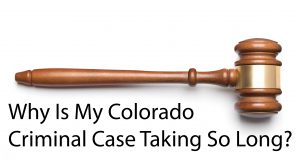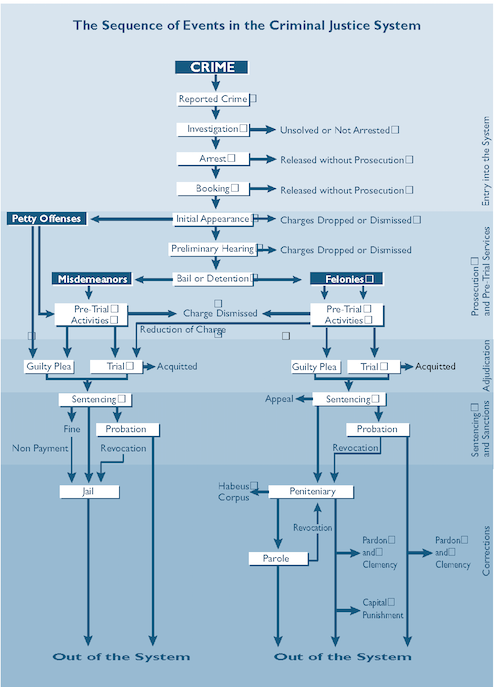Why Is My Colorado Criminal Case Taking So Long?

By H. Michael Steinberg Colorado Criminal Defense Lawyer
Introduction – Justice Delayed
You have not heard from your criminal defense lawyer for weeks …You might ask yourself “Why is this case taking so damn long?”
The stress and anxiety of your criminal case on you, your family, and close friends may be difficult to measure and describe. The aim of this article is to provide some insight into the Colorado criminal justice system to help you understand the probable reasons for the delays in your case.
While Lady Justice holds her sword and scales, remember that she also wears a blindfold. The blindfold symbolizes that Lady Justice will not suffer improper influence from either side of a case, her “blindness” to such influences as wealth, gender, bias, power, or race can result in slowing the path to justice. The scales represent the weighing of evidence. The snake at her feet represents evil. The book she holds represents the Constitution and her sword represents punishment.
 If you study the symbol, you will notice that the sword is lower than the scales because the punishment stage must always follow the weighing of the strength or weaknesses in the evidence.
If you study the symbol, you will notice that the sword is lower than the scales because the punishment stage must always follow the weighing of the strength or weaknesses in the evidence.
Most people have an expectation that the criminal justice system is both efficient and fair. As the saying goes, “justice delayed is justice denied.” The reality is that this saying does not always ring true, and as argued below, a delay between the alleged commission of a crime and the resolution of the criminal case that follows may sometimes work to the advantage of the accused.
For example, a lengthy delay in a criminal case can have a direct and qualitative impact on the reliability of eyewitness evidence. Over time, it is a fact that witnesses’ memories fade as their lives move on. A delay may also give an experienced Colorado criminal defense lawyer the opportunity they need to thoroughly analyze the evidence in a case and to develop a strong theory of the defense – either to achieve success at trial or to persuade the prosecutor to make a fair and just offer to settle the case.
The lightning-fast resolutions of complex cases seen in shows like Law and Order do not echo reality. Criminal cases working their way through the system necessarily take time because the process itself is complex.
The “Funnel of Justice”
An analogy of the criminal justice system to a common funnel is an apt comparison. Like a funnel, which is much wider at the top and much narrower at the bottom, the thousands of cases under investigation are far greater than the number that actually lead to an arrest or a summons arriving in the mail. The number of cases that are resolved by a plea agreement (~95%) is much greater than the number that will result in a contested jury trial (>5%)
However a criminal case resolves, the time it takes for the resolution of the case is certainly a kind of torture to the accused. If you have been charged with a crime in Colorado, a better understanding of what slows the system will not only place you in a better position to make informed decisions about your case but will also help you to have patience with a slow-moving and overburdened criminal justice system.
This article is intended to provide a greater understanding of why the resolution of a criminal case – felony or misdemeanor – may take more time than one charged in the system had hoped.
Sidebar – Regular Updates From Your Lawyer
If you have been accused of a crime in Colorado, even a simple misdemeanor or a petty offense, your criminal case will likely dominate your thoughts for many months. There is no question that this process can prove difficult and frustrating for many people. By nature, the criminal justice system is extremely slow-moving, and unfortunately, you must embrace the reality of delays.
Your lawyer, (if you have retained a private lawyer or you have been appointed a public defender), will guide you through the stages of your case. However, it is vital to understand that “good lawyering,” means recognition that every case is different. Your lawyer’s job is to modify the defense in your case to match the evidence against you, whilst always striving to achieve the best result.
This takes time.
Why Doesn’t My Lawyer Call Me Every Week?
The answer is simple, while regular “updates” may make you feel better, it is not your lawyer’s job to call if there is nothing to report. Given the slow-moving nature of the criminal justice system, it is unlikely that there will be weekly “updates” in your case and thus, nothing new to relay on a week-to-week basis.
This is a hard fact to accept.
Criminal defense lawyers, depending on the size and scale of the law practice or agency, can have anywhere from tens to hundreds of active cases at any given time. Unless there has been a significant development in the case, a client should not expect a regular “update” on their case. It actually benefits the client to refrain from requesting an update, as it permits their lawyer more time to analyze and investigate their case rather than using precious time giving clients less than meaningful, “updates.”
Examples of significant developments include the discovery of key pieces of evidence in the case such as a critical defense witness, finding important weaknesses in the evidence, communicating major inroads made during ongoing plea negotiations, and contacting the client when there is a need for the client’s input in making a decision that is uniquely the client’s call.
Also, respectfully, please remember that your lawyer is running a law practice and while that lawyer should always respond promptly to questions (within reason), contact should only occur if there is a reason that requires it – for example, if the client has a fully formed and well-thought-out question.
The Stages of Criminal Cases – In Court and Out of Court
This article is not intended to re-review the typical stages of a Colorado criminal case. I, and others, have already outlined what to expect online and many resources are available for that kind of roadmap.
Colorado’s Rules of Criminal procedure govern the stages of each Colorado criminal case. Each stage takes time and each stage of litigation adds to the length and complexity of the process itself.
The Basic Stages of a Criminal Case are:
The Arrest / Summons Return Date
The First Advisement and Bond Setting Hearing
Pre-Trial or “Dispositional” Hearings
A Preliminary Hearing (for the most serious felony charges)
Arraignment (Plea of guilty – plea agreement – or Plea of not guilty and setting for trial)
If Not Guilty Plea – Setting for Trial:
Motions Hearings
Trial
Sentencing Hearing (if there is a conviction)
If Plea Agreement:
Entry of the Plea
Sentencing Hearing
The Four Primary Reasons Why a Colorado Criminal Case May Move Slowly Toward a Resolution
Let’s look behind the curtain of Colorado’s criminal justice system and the main reasons I believe it can be so frustratingly slow.
Reason One – Colorado Criminal Court Calendars
The criminal courts of Colorado literally handle tens of thousands of cases every year. Every week there are “docket days” and there are “trial days” and in some courtrooms, these events can even occur on the same day. The pressure on Colorado’s judges to move their “Sisyphus”- like caseloads is well known to the prosecutors and defense lawyers that practice in these courtrooms.

Sisyphus was a figure of Greek mythology. He was condemned to the eternal punishment of repetitively rolling a boulder up a hill in the lowest depths of hell.
The comparison of the hell that was the task of Sisyphus and the responsibilities placed on the shoulders of our Colorado judges to “move” their caseloads each day is accurate – ask the judges.
While judges may try very hard to push their “boulder” up the mountain as quickly as possible, the sheer volume of criminal cases makes the goal of controlling that massive caseload very difficult.
I have watched for almost 40 years as Colorado’s criminal and civil court calendars fill up, year over year, more and more quickly. While resources have remained almost static, the growth has been exponential. The result has been cases taking longer and longer time to make their way through the system.
Reason 2 – The Discovery Process – Analysis, Investigation and Theorizing the Defense Case
Upon first entering a criminal case, your Colorado criminal defense lawyer will file his or her motion to enter a case, and with that entry, your lawyer will make a “discovery demand.” Upon the filing of the motion for discovery, there is an immediate duty for the District Attorney’s office to provide a copy of the entire contents of their file at that time. This is known as “making discovery.”
That duty, for the state of Colorado to disclose ALL of the evidence, is ongoing. It is never-ending – during every one of the many stages of the case – including all the way through trial.
In serious and complex cases, the process may take several months before it is complete. It is the rare case where ALL of the District Attorney’s evidence has been completed and uploaded for disclosure before charges are filed. These delays can occur due to ongoing police investigation in a case, or the fact that investigating officers do not always file their paper reports, body camera video, and other evidence in a timely fashion – among other reasons.
Each stage in the discovery process provides the defense lawyer an opportunity to carefully analyze and investigate the evidence that the state of Colorado could possibly use at trial. “Making discovery” narrows the issues that are in dispute, and may help advance to the goal of resolving the case with an agreement, or if an agreement cannot be reached, supporting a clear-eyed decision to take the case to trial.
“Discovery” consists of the reports, records, photographs, audio and/or video items created by the police, statements of witnesses, reports by experts, and any forensic testing of, for example, bodily fluids located and seized in the case. In the context of the David and Goliath relationship of the defendant to the state of Colorado, the discovery process is intended to try to “level the playing field” between the parties.
The very foundation of any notions of “due process” in a criminal case lies in the success or failure of this procedure.
The downside, however, may be the inevitable delays that follow.
Discovery and the Theory of Defense
Both the criminal defense lawyer and the prosecutor use the discovery procedure to learn about the strengths and weaknesses of the evidence in the case. From their analysis of their respective cases, they develop their “theory of the case.”
The goal of your lawyer is to attempt to find the most tactical, intelligent, and strategic method of defending your case. A shortlist of just some of the questions raised within the discovery process to determine if there are grounds for the suppression of evidence and possible dismissal of the case include:
Was there probable cause to arrest?
Was the information and complaint properly charged?
Was there an illegal stop or an illegal seizure of evidence?
Is there sufficient evidence to prove beyond a reasonable doubt that the crime or crimes charged can be proven to that high standard?
Is there an unavailable witness critical to proving the crimes charged?
and
Is there missing or lost evidence, such as identification evidence, necessary to prove you committed the crime?
Answering these and dozens of other questions in a careful, logical, and precise manner explains the second reason why criminal cases can take a very long time to resolve – plea negotiations (also known as plea bargaining) rely on a full analysis of the available evidence before negotiations can start.
A Quick Note: “Disagreements” about missing disclosures during the discovery process must sometimes be resolved by litigation involving the judge. If there is a dispute, a defense motion to compel disclosure is filed by your lawyer and a special court date is set. At that hearing, the parties argue the issues alleged in the motion, which is followed by the judge making a decision on the motion. Discovery motions and the hearings that follow may also lengthen the process.
The necessary full “transparency” that is the policy behind the discovery process is a critical component in assisting the criminal defense lawyer to fully understand the case. This process also aids the defense lawyer in providing their client with clear options for making sound decisions in their case.
Reason 3 – Waiting for Forensic Test Results
Using modern technology, the seizure and analysis of scientific evidence, such as DNA, or alcohol and drug tests in DUI or drug crimes cases are common. While ‘CSI-like” immediate results often appear on television, DNA testing, for example, unlike those police procedural shows, actually takes more than an hour to process (and can often take weeks to months).
Lengthy backlogs of samples seized in criminal cases awaiting testing such as “blood tox” tests are the rule. The priorities for completing those tests are most often based on trial priorities – which cases are set for trial and what is the order of those trials based on the speedy trial rights of the accused?
Furthermore, upon receipt of forensic test results, defense attorneys will sometimes require an independent analysis of the very same samples using defense retained and trusted experts. “Retest” results are useful to possibly rebut the state’s test findings.
This equals more delays.
Reason 4 – Plea Bargaining Negotiations
Approximately 90 to 95% of all criminal cases end in a settlement called a plea bargain. That number can be higher in the Federal Criminal Justice System.
While speed and efficiency are important and a case needs to move through the criminal justice system as quickly as the procedures allow, if the parties are to reconcile their differences in a fair and just settlement, the negotiations that follow discovery must be conducted carefully and with precision.
For there to be an agreement – a “plea bargain,” – it is axiomatic that both sides agree to the negotiated result. Negotiations in complex cases often require many communications between the litigants. This takes time, as each side attempts to reach the best result possible for their cause.
“Plea bargaining” can mean several things, including:
Charge Bargaining – pleading guilty to an added lesser charge, or to a lower count which was filed as one of the original charges.
Sentencing Bargaining – pleading to the charge with an agreement to a specific sentence.
Negotiated Deferred Judgement and Sentence or Diversion Type Agreements – These agreements typically result in a “probation-like” sentence which, upon successful completion, will result in a dismissal of the case and the right to seal (removal of the case from the defendant’s criminal history) the record.
A plea bargain means a certainty. If all negotiations break down and a case goes to trial, not only is there a risk of losing, but by definition, there is no plea bargain and that risk includes receiving the highest possible punishment. In some cases, if a defendant chooses to go to trial, it is said that they are punished for exercising that Constitutional right – referred to as a “trial tax.”
Even with this knowledge, a defendant should never compromise and “take the deal” – any deal, if they are truly innocent.
Sidebar – Why Delay in a Criminal Case Can Actually Help to Bring About the Best Result
There is no question that delays in a criminal case have the capacity to “wear down a defendant.” It is tough to wait for answers when one’s future is on hold, but there are solid tactical and common sense reasons why delays in a criminal case are necessary for achieving the best result.
It is a Fact – Older Cases Are Harder to Prove
As noted, this author’s professional career has spanned almost 40 years. As a prosecutor in the 1980’s and 90’s, I had the burden of proving my case. As a defense lawyer over the last 20 plus years, I have had the burden of attacking and discrediting the prosecutor’s case.
It is a fact that the older a case is, the more difficult it is to prove beyond a reasonable doubt and the more vulnerable that case is to attack. Things “happen” to criminal cases – trust me.
Key witnesses may become “unavailable.” Witnesses may lose touch with the prosecutor, may be arrested for new crimes, move away, or may decide to exercise their Fifth Amendment right to remain silent, or otherwise refuse to testify without “conditions” – such as blanket immunity. Key physical evidence may be lost, degrade, or may otherwise become unusable.
Criminal cases that primarily rely on the identification of the accused through eyewitness testimony will inevitably weaken over time. It is well established that the process of recall and courtroom identification is one of the areas most vulnerable to challenge at many levels.
The Undeniable Impact of the Passage of Time on the Need for Revenge and Retribution
Another tenet of an aging case is that the lives of the victims also must “move on.”
“Time moves in one direction, memory in another.” William Gibson
In the most difficult cases, such as violent crimes, or serious car accidents resulting in injuries or death, the passage of time has a way of healing the terrible and natural emotions that initially flood a victim’s mind. The passage of time can lessen the anger and the need for revenge and retribution.
This is not a values-based opinion, it is a fact of life. Time heals victims. The calls to the District Attorney slow down over time and may even stop. Forgiveness sometimes, but not always, may replace the anger that immediately follows the commission of a crime. It is then that the use of restorative justice programs may make sense to bridge the gap between anger/retribution and forgiveness.
Discovering and Comprehending Changes (Weaknesses) in the Case Over Time
The image of the “hard-charging” prosecutor making a speech on the steps of the courthouse is all too familiar. The district attorney, at that moment, assumes that the case, which may look solid when it lands on their intake desk, will stay solid over time.
Again, reality intervenes.
A closer look at the evidence, a review of the key witness interviews, disclosures by the criminal defense attorney from an independent investigation, and other factors, can impact the way that District Attorney “sees” the case.
District Attorneys use “victim advocates” (VA) who help to locate, inform, and assist victims and witnesses with scheduling issues. As time passes, the VA may contact the DA to raise “issues” with key witnesses- locating them, their willingness to testify, etc.
There is a clear impact on the case with the passage of time. Time impacts the lives of witnesses who, like the victims of crime, must respond to changes that are the result of the pressures of daily life. These changes can affect the witnesses’ duty to cooperate and to testify – again, the harsh reality of the criminal justice system.
District Attorney’s who understand their case, not the ones who wait to examine the evidence the weekend before the start of trial, are forced to revisit that confident “courthouse steps speech” and to redesign their case theory, or, a much more likely scenario, prepare a better offer to settle or even, in extreme circumstances, be forced to dismiss the case.
Time to Collect Mitigation Evidence – Background, Character Letters – Proof of Rehabilitation Efforts (Treatment)
Developing “mitigation” information, (the gathering of a package of information to help persuade the district attorney to make a better offer to settle a case, or to assist a judge to view a defendant as a person at a sentencing), can be assembled over time.
Character letters, treatment modalities such as alcohol and drug evaluations, mental health evaluations and treatment, volunteer work, are all examples of developing a mitigation package to use if the case is to settle or at sentencing if a conviction results from a jury trial.
Summary and Conclusion – Why Is My Colorado Criminal Case Taking So Long?
This article was written with the intention of assisting with the anger and frustration that is the result of delays in the evolution of a Colorado criminal case.
It is still understandable that the question “why is this case taking so long?” will be asked notwithstanding the information provided here.
Lawyers who practice Colorado criminal law well understand that it is their duty to reduce, as much as possible, the natural fear and anxiety that results after one is charged with a crime – especially a serious crime. That charge, that responsibility, means fully understanding the strength and weaknesses of my opponent and the case at hand. That process takes time.
This author is keenly aware that our system is terribly flawed, there is no doubt. It is important to remember to reach a just result, to find the truth- it is necessary to intelligently work a case within that flawed system.
Your lawyer’s job is to reach that last – and best- result with the tools that exist
If you found any information I have provided on this web page article helpful please share with others over social media so they may also find it. Thank you.
Never stop fighting – never stop believing in yourself and your right to due process of law.
 ABOUT THE AUTHOR: H. Michael Steinberg – Email The Author at hmsteinberg@hotmail.com – A Denver Colorado Criminal Defense Lawyer – or call his office at 303-627-7777 during business hours – or call his cell if you cannot wait and need his immediate assistance – 720-220-2277. Attorney H. Michael Steinberg is passionate about criminal defense. His extensive knowledge of Colorado Criminal Law and his 42 plus years of experience in the courtrooms of Colorado may give him the edge you need to properly defend your case.
ABOUT THE AUTHOR: H. Michael Steinberg – Email The Author at hmsteinberg@hotmail.com – A Denver Colorado Criminal Defense Lawyer – or call his office at 303-627-7777 during business hours – or call his cell if you cannot wait and need his immediate assistance – 720-220-2277. Attorney H. Michael Steinberg is passionate about criminal defense. His extensive knowledge of Colorado Criminal Law and his 42 plus years of experience in the courtrooms of Colorado may give him the edge you need to properly defend your case.
 Colorado Criminal Lawyer Blog
Colorado Criminal Lawyer Blog


